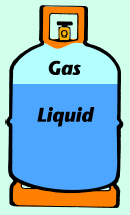Gases - Technical Information

LPG - liquefied petroleum gas
Sold commercially as propane and butane - is hydrocarbon gas that forms a liquid at normal temperatures when pressure is applied to it, and the pressure inside the cylinder is 7-8 bar for propane and 1-2 bar for butane at normal temperatures. When the cylinder valve is opened, gas flows out at these pressures and some of the liquid turns to gas to replace it. However, these pressures are usually too high to be fed directly to appliances and so a regulator has to be fitted to reduce and control the pressure.
Most Bullfinch appliances operate at high pressures (ie in the range 0.35 to 2 bar) since this gives the hot compact flames required for torches, lights and portable heating equipment. The Autotorch brazing system operates at a higher pressure of 4 bar to achieve the higher temperatures for bronze brazing. The fact that the equipment requires one cylinder of gas only containing very high quantities of energy, makes the Bullfinch range ideal for providing heat and light sources that are portable and can be used where other energy supplies are not readily available. The Superglow heaters and most domestic equipment operate at ‘low pressure’ (ie well below 1 bar).
Butane or propane?
Similarities
Both gases burn clearly and have a high calorific value, giving similar flame shapes and heat outputs, and in principle, appliances will burn equally well off either gas.
Differences
However, as gas is drawn off from the cylinder and liquid turns back into gas, the liquid cools down causing the rate of change from liquid to gas to slow down. This effect is particularly marked for butane which will not turn from liquid to a gas below 0oC, so that on cold days or when the gas is being withdrawn at a high rate, the liquid gets so cold that it delivers very low amounts of gas, or indeed no gas at all. Thus butane tends to be used for low pressure domestic appliances indoors, or outdoors in the summer only. Propane continues to turn from liquid to gas at much low temperatures than butane and thus gives a high pressure of gas on the coldest of days. Although propane cylinders can be used indoors on a temporary basis, they should not be stored indoors because of the higher pressures in them.
Thus we recommend propane for our appliances, though butane can be satisfactorily used in many instances.




